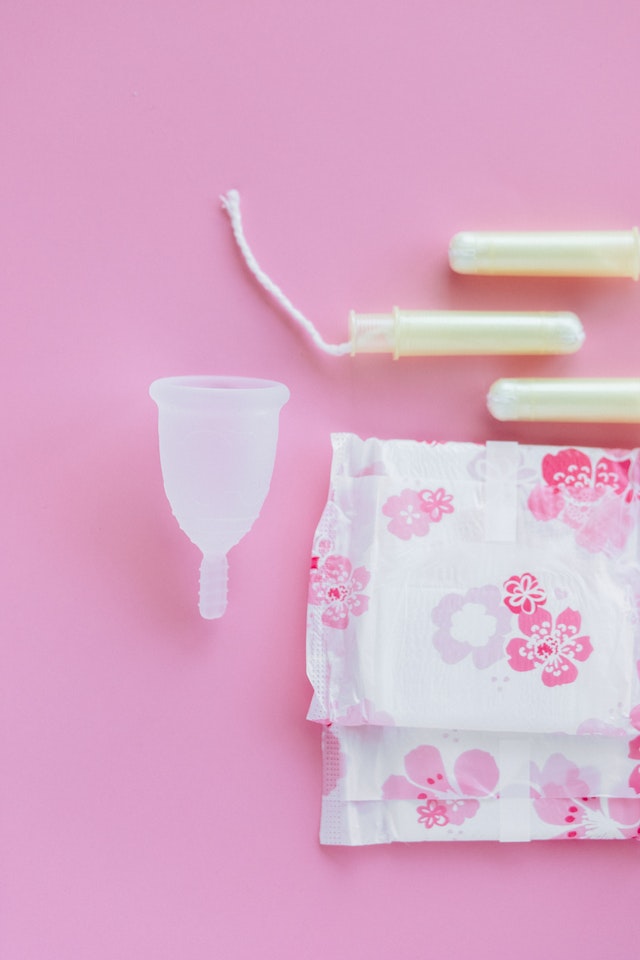You are considered to have heavy periods with blood clots if you need to change your pad or tampon after less than 2 hours or if the clot size is a quarter or larger.
Menorrhagia means blood lasts more than seven days. There are many causes and effects of heavy periods with blood clots that I will mention below.

Heavy periods with blood clots, are they normal
Heavy bleeding is one of the most common problems that women report to their doctors. Naturally, in most cases, menstrual bleeding may contain blood clots, which are a mixture of blood cells, tissues, that line uterus, and proteins.
Heavy periods with blood Clots may be considered a natural defense mechanism for your body to prevent escaping of more blood, the same way that your clotting function plays a role in stopping bleeding in such injury to the tissue or skin.
When to see a doctor?
Heavy periods with blood Clots may be an issue of a health condition and you must ask for medical advice and see your doctor if the clots:
- Are larger than a quarter in size
- Very frequent
- You change your pad or tampon at least every 1 to 2 hours.
- You suffer from severe pain.

The abnormal causes of heavy periods with blood clots
There are many causes of heavy periods, these causes are differentiated according to the age of the patient and the symptoms she is complaining of such as,
Endometriosis
When the normal tissue of your uterus grows outside the uterine cavity, this is called endometriosis, heavy periods vary in size and are mixed with blood are the main symptoms of endometriosis.
Also, the color of blood varies according to the time spent inside the uterus. The longer it stays inside the uterus, the darker it is in color.
Periods can last more than seven days in endometriosis, abdominal pain, and severe pelvic cramps also come with heavy periods with blood clots. Women may suffer from other symptoms of endometriosis;
- Painful bowel movement
- Pain when urinating
- Pelvic pain during exercise
- Pain during sexual intercourse( dyspareunia)
- Ovulation pain
- Acid reflux
- Unknown nerve pain.
Fibroids and uterine and polyps
Fibroids are masses that grow inside the muscle layer of the uterus, while polyps grow through the endometrial layer(the inner lining layer of the uterus) and both cause heavy periods with blood clots, they may cause fertility issues, fibroids are not risk factor of cancer. They are benign growth.
Women with polyps and fibroids may also experience pelvic pressure and pain, bloating is a definite concern with uterine polyps, and may cause weight gain. Removal of fibroids or polyps is a significant treatment to reduce heavy periods.
Women with polyps and fibroids may also experience pelvic pressure and pain, bloating is a definite concern with uterine polyps, and may cause weight gain. Removal of fibroids or polyps is a significant treatment to reduce heavy periods.
Adenomyosis
When the normal tissue that lines the uterus (endometrial tissue) grows into the muscular wall of your uterus, This is called adenomyosis. This tissue acts normally in the muscular layer of your uterus; thickening, breaking down, and bleeding during every single cycle of your periods.
This is not a life-threatening condition, it causes heavy periods with blood clots, and frequent severe pain in your entire pelvis, it may affect your daily activity and have a negative impact on your quality of life.
Anti-inflammatory drugs show an effective relief of pain and reduce the amount and duration of heavy bleeding with blood Clots. Hysterectomy is the net treatment or surgical intervention of adenomyosis.
Dysfunctional uterine bleeding (hormonal disorder)
Polycystic ovary, obesity, insulin resistance, and thyroid problems, are the main causes of hormone imbalance, which affects the endometrium and have excessive growth, So when it is shed during the menstrual cycle causes heavy periods with blood clots, and too much estrogen or no enough progesterone causes heavy bleeding.
Other symptoms that are related to hormone imbalance are bleeding at unusual times ( between periods - after intercourse), and long heavy periods with blood clots for more than seven days.
Oral contraceptive pills can regulate sex hormones and reduce heavy periods.
Pregnancy loss
You could mistake the miscarriage for your periods as it can happen at any time after fertilization, if the heavy periods with blood clots appear suddenly, this is an indication of pregnancy loss. Bright blood also may be an important sign of pregnancy loss.
Now How to stop heavy periods?

How to stop heavy periods with blood clots
As mentioned before you should seek or ask medical advice when you have heavy Periods with blood clots larger than a quarter in size and very frequently your doctor will take a full medical history from you to get all concerns about your condition. And then ask for labs and physical and clinical examinations.
Blood tests
Hormones, levels, thyroid disorder, or even evaluate your anemia.
Ultrasound
Tissue image for your uterus, ovaries, and whole pelvis.
Pap test
Take a smear from the cervix to exclude infection, inflammation, or even cancer.
Endometrial biopsy
To exclude polyps or endometriosis from the endometrial lining.
These clinical interventions are based on each other, so the doctor can make a definite diagnosis of your heavy periods of blood clots causes, and also can decide on the treatment of your illness to reduce your suffering from heavy periods with blood clots.
The treatment issues are based on many factors concerning you, including:
- Your overall health condition and medical history.
- The effect of your condition on your quality of life.
- The cause and severity of your condition.
- Your sexual life, and intending to have babies or not.
- Your tolerance for a specific medication, or procedure.
- Your opinions and concerns about your illness.
Your doctor will explain to you all the medical and surgical treatments that are available for your condition, and I will explain them separately.
Medical treatment
Non-steroidal anti-inflammatory drugs (NSAID)
Such as ibuprofen have a significant effect in reducing the amount of bleeding and also relieving pain and pelvic cramps.
Tranexamic acid
Has the same effect as NSAIDs in reducing blood loss.
Oral contraceptive pills, which calculate six hormones and your menstrual cycle.
Oral progesterone
A hormonal IUD makes endometrial tissue thin and decreases menstrual flow.
You may suffer from anemia due to heavy periods with blood clots, so the doctor will prescribe an iron supplement to be taken regularly even when you are not anemic.
Surgical treatment
If the medical treatments fail to relieve your symptoms, surgical intervention will be recommended.
- Dilatation and curettage, the doctor, let the cervix and the scrap tissue from the endometrium lining.
- Uterine artery embolization blocks the artery and shrinks the fibroids.
- Myomectomy, surgical removal of fibroids.
- Endometrial ablation destroys your endometrial tissue.
- Hysterectomy is surgery to remove your uterus and cervix.
Even Heavy periods with blood clots are not life-threatening conditions, they affect your quality of life. We hope we explained them briefly and clearly to be aware of your body's health issues and how to handle them.
Read more about:


You must be logged in to post a comment.